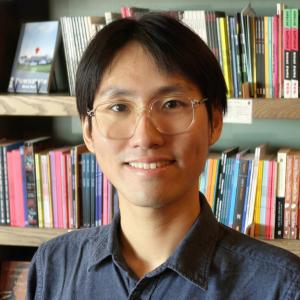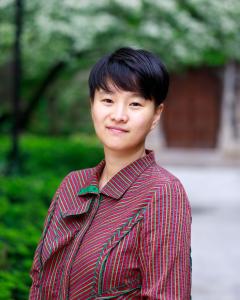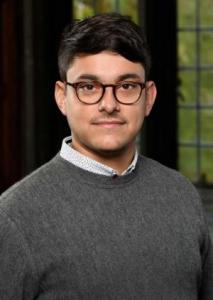Announcing the 2024-25 Dissertation Fellows
CISSR is pleased to announce the 2024-2025 Dissertation Fellows. Representing four departments and disciplines, our fellows will complete their dissertations focusing on international and transnational social science research. The CISSR Dissertation Completion Grant provides funding, office space, and research support to outstanding doctoral candidates conducting innovative research on global topics. This fellowship reflects CISSR’s commitment to advancing rigorous social science scholarship at the University of Chicago.
The Dissertation Fellows’ projects span various global regions demonstrating the value of interdisciplinary and international research. CISSR aims to continue developing international social science research by supporting and growing an interdisciplinary community of researchers within the university and beyond.
We invite you to read more about the Dissertation Fellows and their projects below.
Xiaogao Zhou (Sociology)
“In Transition: Politics of Transgender Healthcare in China”
Xiaogao Zhou, a doctoral candidate in sociology, studies gender, sexuality, and medicine through a transnational lens. His research combines medical sociology, queer theory, and transgender studies and explores institutional regulation of gender and sexual diversity. Zhou's work has been published in journals including Social Problems, Social Science & Medicine, and Journal of Homosexuality.
Zhou’s project investigates how local healthcare systems adapt to global initiatives, focusing on gender-affirming care in China—services defined by international standards to support individuals’ gender identities. His research examines the social and political dynamics shaping healthcare delivery for transgender individuals. It finds that despite activism’s success in expanding medical procedures and in influencing state policies in China, clinicians still gatekeep care based on the perception of transgender people’s ability to reintegrate socially, specifically in receiving familial support and maintaining economic productivity. This gatekeeping forces transgender people to navigate a mix of formal and informal healthcare, leading to health inequalities tied to gender, social class, and community networks. Zhou thus argues that local adaptation of global health guidelines can create new exclusions and inequalities. This project exhibits how transnational and local processes reproduce barriers to healthcare for socially marginalized communities.
Myungji Lee (Anthropology)
“Turkish Conservative Muslim Women and State-Sponsored Islamic Education”
Myungji Lee is a PhD candidate in the Department of Anthropology. Originally from South Korea, she earned her B.A. in anthropology and history from Seoul National University and an M.A. in anthropology from the University of Chicago. Her research interests include Islam and the modern state, religious conservatism, and women and family life in Turkey.
Lee’s project explores the co-production of modern Turkey's state-run Islamic education and conservative Muslim women's pursuit of a good life. By analyzing everyday interactions between state women preachers and their female audience, it investigates how these women envision a modern democracy rooted in Islamic rather than secular categories. The research focuses on conservative women whose ethical-religious visions align with the "authoritarian" state, examining how the preachers and their pupils collectively develop and enact conceptual formations about individual selfhood (freedom, intention, agency) and communal life (authority, equality, governance) based on their interpretation of Islam. In illustrating how these formulations resonate with the broader question of what freedoms and equality should be granted to Muslims under a liberal democracy, her dissertation advocates for incorporating such conservative visions in pluralistic politics that allow diverse Muslim and non-Muslim groups to craft a common life with less fear and anxiety.
Rohan Chatterjee (History)
“When A World Moves On: Land, Life and Struggle in the Peruvian Andes”
Rohan Chatterjee is a PhD Candidate in History who studies Environmental and Latin American history, particularly land tenancy, land use, and property rights. His research interests include twentieth-century Latin America, Peru; agrarian and Indigenous histories; and Anthropocene and environmental history. His dissertation project has also been generously funded by the Fulbright-Hays DDRA Program, Center for Advanced Studies, Mellon Foundation, and the Tinker Foundation.
Chatterjee’sproject challenges the view of peasant agriculture as a marginal, disappearing activity by tracing its dramatic expansion in 20th-century Peru. Through a longue durée study of a single valley, it documents how demographic growth led to land pressure, fragmented tenancy, intensified production, and ecological reordering. The research reveals that peasant numbers and production reached unprecedented levels, contributing significantly to social and ecological transformations globally, and demonstrating that these changes are more than just localized to a few regions (particularly the Global North) or certain activities (like fossil fuel use and industrialization). It highlights the often-overlooked role of peasants in shaping modern landscapes and economies, demonstrating how crucial their experiences are to comprehend the full scope of global environmental and social change.
Madeleine Stevens (Political Science)
“Weaponizing Uncertainty: The Politics of Disappearance in Argentina, Colombia, and Mexico”
Madeleine Stevens is a PhD candidate in Political Science with concentrations in Comparative Politics and International Relations. She is also a 2023-2024 USIP-Minerva Peace and Security Scholar. Her research interests include political violence and its legacies, covert action, and human rights, with a particular focus on Latin America and qualitative methods. In addition to the United States Institute of Peace, the Minerva Research Initiative, and CISSR, her work has been supported by the University of Chicago Center for Latin American Studies, Pozen Family Center for Human Rights, and Pearson Institute for the Study and Resolution of Global Conflicts. Stevens has an MA in Political Science and a BA in Communication summa cum laude from the University of Pennsylvania.
Stevens’s project examines the rationale behind disappearances perpetrated by states and armed groups. It challenges existing focus on blame evasion, proposing a new typology and theory of disappearance as violent communication. The dissertation argues that perpetrators use various types of disappearances to express political motives, demobilize populations through uncertainty, and gain approval from sympathetic observers. It explores how different methods of disappearance communicate power, presence, and conceptions of political order and victim worth. By analyzing these variations, the research reveals disappearances as complex tactics conveying distinct messages to different audiences, rather than solely blame-avoidance strategies. This approach offers new insights into the communicative and strategic use of disappearances in political violence.
 THE UNIVERSITY OF CHICAGO
THE UNIVERSITY OF CHICAGO





